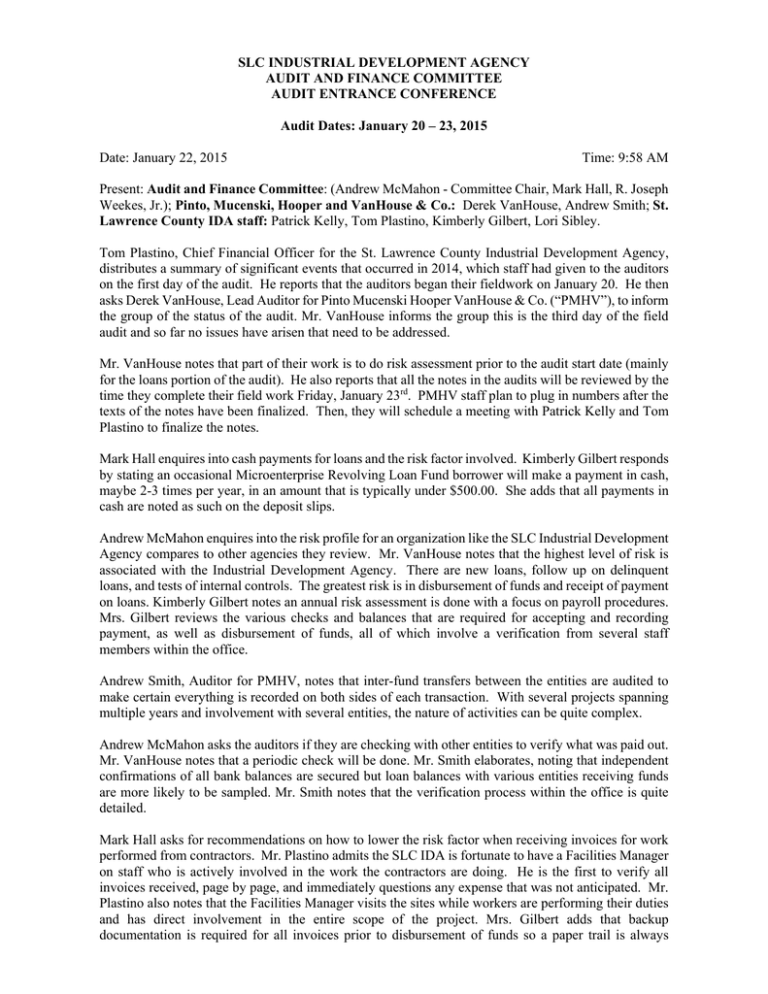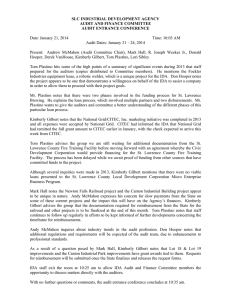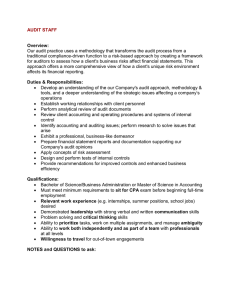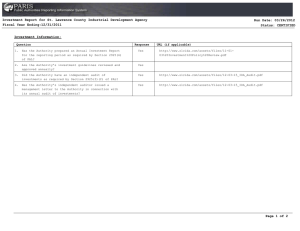Document 12049779
advertisement

SLC INDUSTRIAL DEVELOPMENT AGENCY AUDIT AND FINANCE COMMITTEE AUDIT ENTRANCE CONFERENCE Audit Dates: January 20 – 23, 2015 Date: January 22, 2015 Time: 9:58 AM Present: Audit and Finance Committee: (Andrew McMahon - Committee Chair, Mark Hall, R. Joseph Weekes, Jr.); Pinto, Mucenski, Hooper and VanHouse & Co.: Derek VanHouse, Andrew Smith; St. Lawrence County IDA staff: Patrick Kelly, Tom Plastino, Kimberly Gilbert, Lori Sibley. Tom Plastino, Chief Financial Officer for the St. Lawrence County Industrial Development Agency, distributes a summary of significant events that occurred in 2014, which staff had given to the auditors on the first day of the audit. He reports that the auditors began their fieldwork on January 20. He then asks Derek VanHouse, Lead Auditor for Pinto Mucenski Hooper VanHouse & Co. (“PMHV”), to inform the group of the status of the audit. Mr. VanHouse informs the group this is the third day of the field audit and so far no issues have arisen that need to be addressed. Mr. VanHouse notes that part of their work is to do risk assessment prior to the audit start date (mainly for the loans portion of the audit). He also reports that all the notes in the audits will be reviewed by the time they complete their field work Friday, January 23rd. PMHV staff plan to plug in numbers after the texts of the notes have been finalized. Then, they will schedule a meeting with Patrick Kelly and Tom Plastino to finalize the notes. Mark Hall enquires into cash payments for loans and the risk factor involved. Kimberly Gilbert responds by stating an occasional Microenterprise Revolving Loan Fund borrower will make a payment in cash, maybe 2-3 times per year, in an amount that is typically under $500.00. She adds that all payments in cash are noted as such on the deposit slips. Andrew McMahon enquires into the risk profile for an organization like the SLC Industrial Development Agency compares to other agencies they review. Mr. VanHouse notes that the highest level of risk is associated with the Industrial Development Agency. There are new loans, follow up on delinquent loans, and tests of internal controls. The greatest risk is in disbursement of funds and receipt of payment on loans. Kimberly Gilbert notes an annual risk assessment is done with a focus on payroll procedures. Mrs. Gilbert reviews the various checks and balances that are required for accepting and recording payment, as well as disbursement of funds, all of which involve a verification from several staff members within the office. Andrew Smith, Auditor for PMHV, notes that inter-fund transfers between the entities are audited to make certain everything is recorded on both sides of each transaction. With several projects spanning multiple years and involvement with several entities, the nature of activities can be quite complex. Andrew McMahon asks the auditors if they are checking with other entities to verify what was paid out. Mr. VanHouse notes that a periodic check will be done. Mr. Smith elaborates, noting that independent confirmations of all bank balances are secured but loan balances with various entities receiving funds are more likely to be sampled. Mr. Smith notes that the verification process within the office is quite detailed. Mark Hall asks for recommendations on how to lower the risk factor when receiving invoices for work performed from contractors. Mr. Plastino admits the SLC IDA is fortunate to have a Facilities Manager on staff who is actively involved in the work the contractors are doing. He is the first to verify all invoices received, page by page, and immediately questions any expense that was not anticipated. Mr. Plastino also notes that the Facilities Manager visits the sites while workers are performing their duties and has direct involvement in the entire scope of the project. Mrs. Gilbert adds that backup documentation is required for all invoices prior to disbursement of funds so a paper trail is always available. Mr. Smith acknowledges dealings thus far have been typically one contractor per project rather than multiple contractors, so it is conceivable that more control of the risk might be necessary for more complex projects. Relative to the Newton Falls Railroad project, Mr. Smith notes thus far all expenses have been fully reimbursable. It is anticipated that the risk will minimize each year as the project moves forward. In regards to Authorities Budget Office (“ABO”) requirements, Mr. Hall asks if the audit team looks at what the state requires to make certain the IDA is in compliance. Mr. VanHouse acknowledges that ABO requirements are not dealt with specifically in the audit. However, Mr. Smith notes that they verify that policies have been established as required by directives issued by the ABO; the auditors verify such that such documents are in place (e.g., the Whistle Blower Policy and the Conflict of Interest Policy). The Audit Team will make certain these policies are reviewed annually where applicable. IDA staff exit the room at 10:21 am to allow IDA Audit and Finance Committee members the opportunity to discuss matters confidentially and directly with the auditors. With no further questions or comments, the audit entrance conference concludes at 10:30 am.






